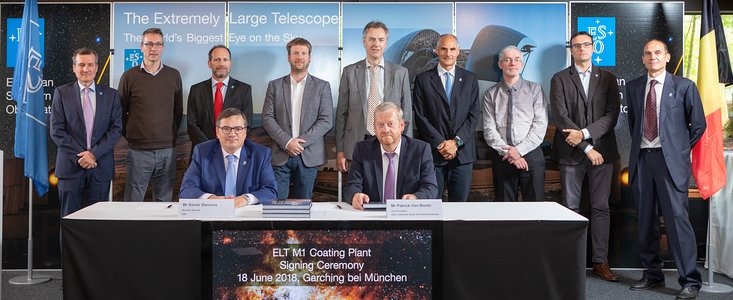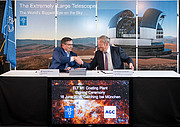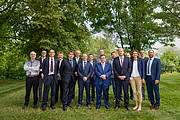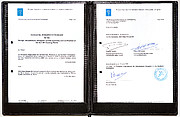Announcement
Contract Awarded for Coating Plant for ELT Primary Mirror Segments
18 June 2018
The contract for the design, manufacture and installation of the coating plant for the primary mirror segments of ESO’s Extremely Large Telescope has been awarded to Belgium-based AGC Glass Europe. The company will be responsible for the construction of the facilities at ESO’s Paranal Observatory in northern Chile which will be used to coat the telescope’s individual primary mirror segments with a protected layer of highly reflective silver.
The contract was signed by Patrick Van Bortel, Vice-President of Industrial Glass and New Businesses, AGC Glass Europe, and Xavier Barcons, Director General of ESO, at a ceremony held at ESO Headquarters in Garching, Germany on 18 June 2018. A third signatory, Philippe Bastien, Regional President Building and Industrial Glass, AGC Glass Europe, was unable to attend the signature event and signed the contract beforehand.
Christian Klima, the Honorary Consul of the Kingdom of Belgium in Bavaria and Quentin Derzelle, the Trade and Commercial Attaché to the Honorary Consulate of the Kingdom of Belgium in Bavaria were also in attendance, as was the Belgian Delegate to the ESO Finance Committee, Alain Heynen from Belspo.
ESO’s Extremely Large Telescope — currently under construction on Cerro Armazones, high in the Atacama Desert — will have a 39-metre primary mirror consisting of 798 individual mirror segments.
The planned coating plant will use a process known as magnetron sputtering to coat each individual mirror with a thin layer of silver and a protective coating. A similar process is currently used to coat the 8.2-metre mirrors of the Very Large Telescope with aluminium. However, by using a more reflective silver coating the ELT will be able to gather more light — allowing ESO astronomers to observe the night sky in astonishing detail.
The contracts for the casting and polishing of the mirror segments have already been signed. The 798 hexagonal segments will be produced from the low-expansion ceramic material Zerodur® by SCHOTT, before being passed to Safran Reosc, who will design the mounting interfaces, polish the segments, integrate them into their support systems, and then perform optical tests before delivery [1].
The new contract secures the facility needed to coat the mirror segments, both before and during ELT operation. As the giant mirror will be open to the night sky each night, the mirror segments will accumulate dust and become less reflective over time, and will have to be regularly recoated — at a rate of several mirror segments per day.
AGC Glass Europe has a long history of innovation in glass technology, and will use its experience to meet the challenge of keeping the ELT mirror at peak optical performance — allowing ESO to tackle some of the biggest scientific challenges of our time.
Notes
[1] Each mirror segment will have surface irregularities no larger than 10 nanometres. This is extraordinarily precise — roughly 10 000 times smaller than the width of a human hair. If the mirrors were scaled up to the size of France, the largest irregularities would be the size of a ladybird!
Links
Contacts
Pierre Sansgasset
Coating System Engineer
ESO Paranal Observatory
II Región, Chile
Tel: +56 55 2435 5264
Email: psansgas@eso.org
Richard Hook
ESO Public Information Officer
Garching bei München, Germany
Tel: +49 89 3200 6655
Cell: +49 151 1537 3591
Email: pio@eso.org
About the Announcement
| Id: | ann18045 |
Our use of Cookies
We use cookies that are essential for accessing our websites and using our services. We also use cookies to analyse, measure and improve our websites’ performance, to enable content sharing via social media and to display media content hosted on third-party platforms.
ESO Cookies Policy
The European Organisation for Astronomical Research in the Southern Hemisphere (ESO) is the pre-eminent intergovernmental science and technology organisation in astronomy. It carries out an ambitious programme focused on the design, construction and operation of powerful ground-based observing facilities for astronomy.
This Cookies Policy is intended to provide clarity by outlining the cookies used on the ESO public websites, their functions, the options you have for controlling them, and the ways you can contact us for additional details.
What are cookies?
Cookies are small pieces of data stored on your device by websites you visit. They serve various purposes, such as remembering login credentials and preferences and enhance your browsing experience.
Categories of cookies we use
Essential cookies (always active): These cookies are strictly necessary for the proper functioning of our website. Without these cookies, the website cannot operate correctly, and certain services, such as logging in or accessing secure areas, may not be available; because they are essential for the website’s operation, they cannot be disabled.
Functional Cookies: These cookies enhance your browsing experience by enabling additional features and personalization, such as remembering your preferences and settings. While not strictly necessary for the website to function, they improve usability and convenience; these cookies are only placed if you provide your consent.
Analytics cookies: These cookies collect information about how visitors interact with our website, such as which pages are visited most often and how users navigate the site. This data helps us improve website performance, optimize content, and enhance the user experience; these cookies are only placed if you provide your consent. We use the following analytics cookies.
Matomo Cookies:
This website uses Matomo (formerly Piwik), an open source software which enables the statistical analysis of website visits. Matomo uses cookies (text files) which are saved on your computer and which allow us to analyze how you use our website. The website user information generated by the cookies will only be saved on the servers of our IT Department. We use this information to analyze www.eso.org visits and to prepare reports on website activities. These data will not be disclosed to third parties.
On behalf of ESO, Matomo will use this information for the purpose of evaluating your use of the website, compiling reports on website activity and providing other services relating to website activity and internet usage.
Matomo cookies settings:
Additional Third-party cookies on ESO websites: some of our pages display content from external providers, e.g. YouTube.
Such third-party services are outside of ESO control and may, at any time, change their terms of service, use of cookies, etc.
YouTube: Some videos on the ESO website are embedded from ESO’s official YouTube channel. We have enabled YouTube’s privacy-enhanced mode, meaning that no cookies are set unless the user actively clicks on the video to play it. Additionally, in this mode, YouTube does not store any personally identifiable cookie data for embedded video playbacks. For more details, please refer to YouTube’s embedding videos information page.
Cookies can also be classified based on the following elements.
Regarding the domain, there are:
- First-party cookies, set by the website you are currently visiting. They are stored by the same domain that you are browsing and are used to enhance your experience on that site;
- Third-party cookies, set by a domain other than the one you are currently visiting.
As for their duration, cookies can be:
- Browser-session cookies, which are deleted when the user closes the browser;
- Stored cookies, which stay on the user's device for a predetermined period of time.
How to manage cookies
Cookie settings: You can modify your cookie choices for the ESO webpages at any time by clicking on the link Cookie settings at the bottom of any page.
In your browser: If you wish to delete cookies or instruct your browser to delete or block cookies by default, please visit the help pages of your browser:
Please be aware that if you delete or decline cookies, certain functionalities of our website may be not be available and your browsing experience may be affected.
You can set most browsers to prevent any cookies being placed on your device, but you may then have to manually adjust some preferences every time you visit a site/page. And some services and functionalities may not work properly at all (e.g. profile logging-in, shop check out).
Updates to the ESO Cookies Policy
The ESO Cookies Policy may be subject to future updates, which will be made available on this page.
Additional information
For any queries related to cookies, please contact: pdprATesoDOTorg.
As ESO public webpages are managed by our Department of Communication, your questions will be dealt with the support of the said Department.





